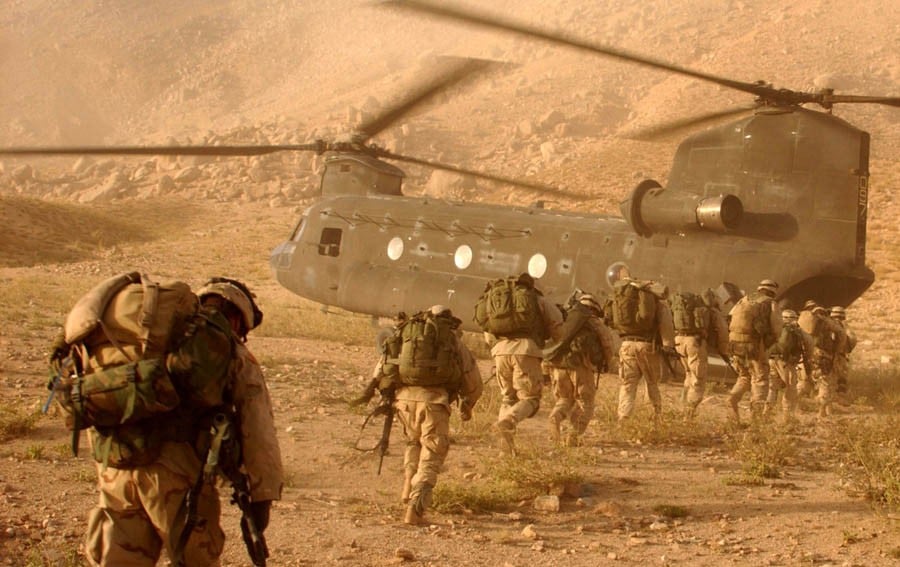
The US should show Taliban that there would be no withdrawal until they discard their militia status and become a political party. Afghanistan under Taliban shouldn’t be an option this time!

It is too early to foretell that US might seek to discard its self-imagined role as an international policeman. Donald Trump has ordered the withdrawal of US forces from Syria and his administration seems serious to pullout its forces from Afghanistan too. The US has maintained hundreds of bases around the globe. One wonders if it will seek a few more in Afghanistan too. Regional states -- Iran, Pakistan and Russia -- have long been suspicious that Washington had appetite for permanent military bases in the country as well.
All the regional states around Afghanistan seem in agreement to see the eventual US withdrawal from Afghanistan. They have been participating in the peace efforts. The absence of public disagreement among the otherwise contending neighbours of Afghanistan is a strong indication of their satisfaction with the ongoing Afghan peace process. They can read that US under Trump is hastening to exit from Afghanistan and they can only welcome such a prospect.
Nevertheless, there is a worry, which is not unfounded. The US precipitous pullout raises the spectre of Afghanistan reverting to the civil war of 1990s. Like during civil war back then, Taliban may once again capitalize on the anticipated power vacuum.
Perhaps Zamir Kabulov, President Vladimir Putin’s Afghanistan envoy, was responding to such a fear on February 12 when he told reporters in Moscow that the US forces’ pullout from Afghanistan won’t lead to a potential power vacuum in the country. "When all Afghans, the authorities in Kabul and the Taliban, reach a peace agreement and won’t fight each other, then they’ll deal with ISIS (Daesh) in an Afghan manner," the Russian envoy said. He also warned that if the US chooses to stay on in Afghanistan, its forces will face a humiliating defeat: "they could stay for another few years but in the end, they’ll have to go, and this time in disgrace," the envoy tried to predict. The Russian envoy made these comments before he was scheduled to meet the US special representative for Afghanistan reconciliation Zalmay Khalilzad in Ankara on February 22.
Islamabad has traditionally entertained the prospect of a pro-Pakistan and anti-India government in Kabul. Pakistan’s Afghan policy has traditionally remained an extension of its India policy. The US presence in Afghanistan is the insurmountable challenge for Pakistan to effect a regime change at the court of Kabul. Although Pakistan will only welcome the US withdrawal, events after Pulwama attack suggest that the former, given its linkages with Taliban, may use peace talks as leverage in other issues too.
On February 22, Pakistan’s ambassador to Afghanistan said that if India resorted to violence, as tensions between Islamabad and Delhi have risen after a suicide bomber killed dozens of Indian paramilitary policemen in the occupied Kashmir, it will "affect the stability of the entire region and impact the momentum." Probably, it was a thinly veiled warning to the US to seek its attention on the issue of Kashmir or at least to pressurise Washington to pile pressure on India to desist from making provoking statements.
Pakistan, a weaker party vis-à-vis India, has traditionally sought third party arbitration in the resolution of Kashmir issue. On the other hand, India treats Kashmir as a bilateral issue and is against any third party involvement. The ambassador’s statement is an indication of the vulnerability and fragility of the Afghan peace talks.
If Pakistan, one of the key players in the region encompassing war-torn Afghanistan, chooses to derail the Afghan peace process, talks may break down and months of careful diplomacy will be unraveled. Who could know this better than the Afghan government, which sees Taliban as Pakistan’s proxy force. Kabul called upon Islamabad "to act upon its commitments with regards to Afghanistan, particularly those in relation to peace and refrain from making irrelevant statements that do not help solve any problem."
Iran heaved a sigh of relief when Taliban were driven out of power in 2001. But the country does want the permanent presence of a sworn enemy in the Afghan backyard. Much like other regional states, Tehran sees in Taliban a proxy role to help force US out of Afghanistan.
In the face of fierce regional opposition to the US permanent presence in Kabul, the US forces may eventually withdraw. The US does not have the privilege of a strong central government in Kabul, which might have permitted its longer stay, the likelihood of which is now very slim given Taliban’s armed opposition to any foreign stay in Afghanistan.
Whatever the case be, before quitting Afghanistan, policymakers in Washington must know that empty guarantees, the ones given by Taliban, won’t stop Islamists from sheltering the likes of al Qaeda and other international terrorist outfits. Hoisting the flag of Islam throughout the world is a credo all Islamists share; Taliban are no exception.
The US should show Taliban that there would be no withdrawal until they discard their militia status and become a political party, which subscribes to Afghan constitution. Afghans have suffered a great deal. Afghanistan under Taliban shouldn’t be an option this time!